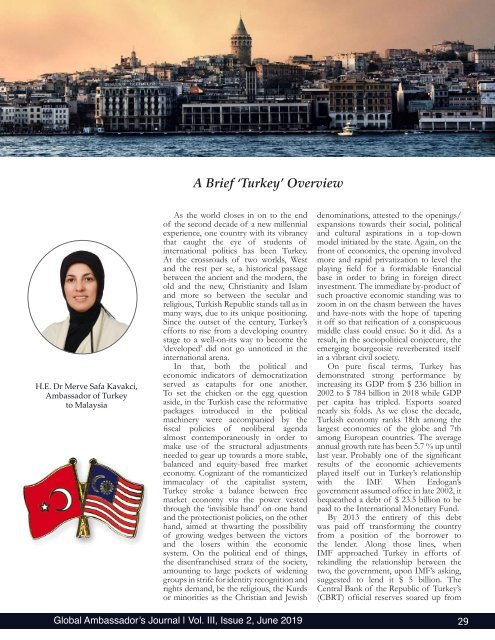Global Ambassador's Journal Vol 3, Issue 2 June 2019
Global Ambassador’s Journal is the premiere magazine for diplomats and the first online magazine of an international organization to be devoted solely to the publication of articles and comments by worldwide current or former state Ambassadors focusing on diplomacy and international relations.
Global Ambassador’s Journal is the premiere magazine for diplomats and the first online magazine of an international organization to be devoted solely to the publication of articles and comments by worldwide current or former state Ambassadors focusing on diplomacy and international relations.
Create successful ePaper yourself
Turn your PDF publications into a flip-book with our unique Google optimized e-Paper software.
A Brief ‘Turkey’ Overview<br />
H.E. Dr Merve Safa Kavakci,<br />
Ambassador of Turkey<br />
to Malaysia<br />
As the world closes in on to the end<br />
of the second decade of a new millennial<br />
experience, one country with its vibrancy<br />
that caught the eye of students of<br />
international politics has been Turkey.<br />
At the crossroads of two worlds, West<br />
and the rest per se, a historical passage<br />
between the ancient and the modern, the<br />
old and the new, Christianity and Islam<br />
and more so between the secular and<br />
religious, Turkish Republic stands tall as in<br />
many ways, due to its unique positioning.<br />
Since the outset of the century, Turkey’s<br />
efforts to rise from a developing country<br />
stage to a well-on-its way to become the<br />
‘developed’ did not go unnoticed in the<br />
international arena.<br />
In that, both the political and<br />
economic indicators of democratization<br />
served as catapults for one another.<br />
To set the chicken or the egg question<br />
aside, in the Turkish case the reformative<br />
packages introduced in the political<br />
machinery were accompanied by the<br />
fiscal policies of neoliberal agenda<br />
almost contemporaneously in order to<br />
make use of the structural adjustments<br />
needed to gear up towards a more stable,<br />
balanced and equity-based free market<br />
economy. Cognizant of the romanticized<br />
immaculacy of the capitalist system,<br />
Turkey stroke a balance between free<br />
market economy via the power vested<br />
through the ‘invisible hand’ on one hand<br />
and the protectionist policies, on the other<br />
hand, aimed at thwarting the possibility<br />
of growing wedges between the victors<br />
and the losers within the economic<br />
system. On the political end of things,<br />
the disenfranchised strata of the society,<br />
amounting to large pockets of widening<br />
groups in strife for identity recognition and<br />
rights demand, be the religious, the Kurds<br />
or minorities as the Christian and Jewish<br />
denominations, attested to the openings/<br />
expansions towards their social, political<br />
and cultural aspirations in a top-down<br />
model initiated by the state. Again, on the<br />
front of economics, the opening involved<br />
more and rapid privatization to level the<br />
playing field for a formidable financial<br />
base in order to bring in foreign direct<br />
investment. The immediate by-product of<br />
such proactive economic standing was to<br />
zoom in on the chasm between the haves<br />
and have-nots with the hope of tapering<br />
it off so that reification of a conspicuous<br />
middle class could ensue. So it did. As a<br />
result, in the sociopolitical conjecture, the<br />
emerging bourgeoisie reverberated itself<br />
in a vibrant civil society.<br />
On pure fiscal terms, Turkey has<br />
demonstrated strong performance by<br />
increasing its GDP from $ 236 billion in<br />
2002 to $ 784 billion in 2018 while GDP<br />
per capita has tripled. Exports soared<br />
nearly six folds. As we close the decade,<br />
Turkish economy ranks 18th among the<br />
largest economies of the globe and 7th<br />
among European countries. The average<br />
annual growth rate has been 5.7 % up until<br />
last year. Probably one of the significant<br />
results of the economic achievements<br />
played itself out in Turkey’s relationship<br />
with the IMF. When Erdogan’s<br />
government assumed office in late 2002, it<br />
bequeathed a debt of $ 23.5 billion to be<br />
paid to the International Monetary Fund.<br />
By 2013 the entirety of this debt<br />
was paid off transforming the country<br />
from a position of the borrower to<br />
the lender. Along those lines, when<br />
IMF approached Turkey in efforts of<br />
rekindling the relationship between the<br />
two, the government, upon IMF’s asking,<br />
suggested to lend it $ 5 billion. The<br />
Central Bank of the Republic of Turkey’s<br />
(CBRT) official reserves soared up from<br />
<strong>Global</strong> Ambassador’s <strong>Journal</strong> | <strong>Vol</strong>. III, <strong>Issue</strong> 2, <strong>June</strong> <strong>2019</strong> 29




